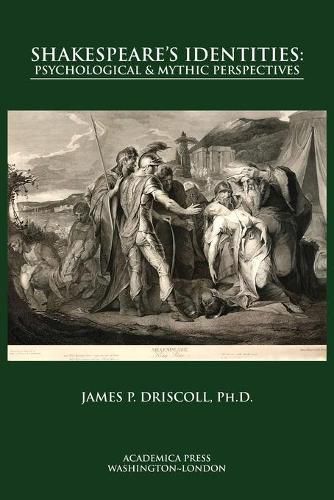Readings Newsletter
Become a Readings Member to make your shopping experience even easier.
Sign in or sign up for free!
You’re not far away from qualifying for FREE standard shipping within Australia
You’ve qualified for FREE standard shipping within Australia
The cart is loading…






This title is printed to order. This book may have been self-published. If so, we cannot guarantee the quality of the content. In the main most books will have gone through the editing process however some may not. We therefore suggest that you be aware of this before ordering this book. If in doubt check either the author or publisher’s details as we are unable to accept any returns unless they are faulty. Please contact us if you have any questions.
No dramatist has treated identity in as many ways and in such depth as William Shakespeare. In Shakespeare’s Identities, James P. Driscoll shows how the Bard used history, comedy, tragedy, and romance to develop comprehensive treatments of personal identity.
Driscoll’s innovative study examines four aspects of identity: the conscious, social, real, and ideal. Drawing on Jungian psychoanalysis, Driscoll explores how Shakespeare’s plays dramatize a crucial need for self-knowledge and foreshadow larger identity issues. Sexual identity and the archetype of the outcast provide new perspectives on The Merchant of Venice. Hamlet’s quest for self-knowledge mirrors parallel quests that Jung found mythic heroes pursuing. Iago shrewdly exploits Othello’s racial outcast status and confused conscious and social identities to convince him that Desdemona’s real identity has changed. In Twelfth Night, as in the other romantic comedies, family, relationships, love, friendship, imagination, disguise, and time and place all shape identity. Measure for Measure is a profoundly political drama showing the interdependence of love and knowledge in the quest to understand real identity and achieve ideal identity. King Lear treats identity both archetypally and realistically to create a uniquely powerful tragic vision of the self and divinity.
From Falstaff to Shylock, Hamlet, Othello, Iago, Lear, and Prospero Driscoll offers original insights and perspectives on Shakespeare’s most fascinating characters. This new volume will hold great interest for students of Shakespeare and all English literature, along with all those concerned with the enduring issues of identity.
$9.00 standard shipping within Australia
FREE standard shipping within Australia for orders over $100.00
Express & International shipping calculated at checkout
This title is printed to order. This book may have been self-published. If so, we cannot guarantee the quality of the content. In the main most books will have gone through the editing process however some may not. We therefore suggest that you be aware of this before ordering this book. If in doubt check either the author or publisher’s details as we are unable to accept any returns unless they are faulty. Please contact us if you have any questions.
No dramatist has treated identity in as many ways and in such depth as William Shakespeare. In Shakespeare’s Identities, James P. Driscoll shows how the Bard used history, comedy, tragedy, and romance to develop comprehensive treatments of personal identity.
Driscoll’s innovative study examines four aspects of identity: the conscious, social, real, and ideal. Drawing on Jungian psychoanalysis, Driscoll explores how Shakespeare’s plays dramatize a crucial need for self-knowledge and foreshadow larger identity issues. Sexual identity and the archetype of the outcast provide new perspectives on The Merchant of Venice. Hamlet’s quest for self-knowledge mirrors parallel quests that Jung found mythic heroes pursuing. Iago shrewdly exploits Othello’s racial outcast status and confused conscious and social identities to convince him that Desdemona’s real identity has changed. In Twelfth Night, as in the other romantic comedies, family, relationships, love, friendship, imagination, disguise, and time and place all shape identity. Measure for Measure is a profoundly political drama showing the interdependence of love and knowledge in the quest to understand real identity and achieve ideal identity. King Lear treats identity both archetypally and realistically to create a uniquely powerful tragic vision of the self and divinity.
From Falstaff to Shylock, Hamlet, Othello, Iago, Lear, and Prospero Driscoll offers original insights and perspectives on Shakespeare’s most fascinating characters. This new volume will hold great interest for students of Shakespeare and all English literature, along with all those concerned with the enduring issues of identity.